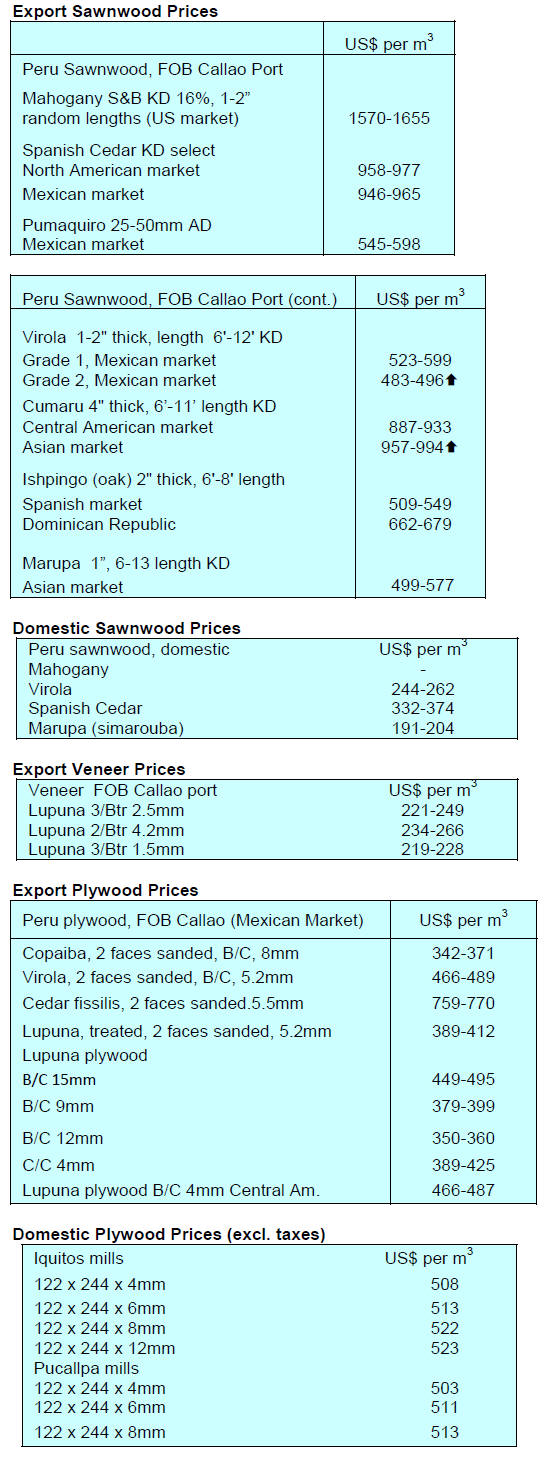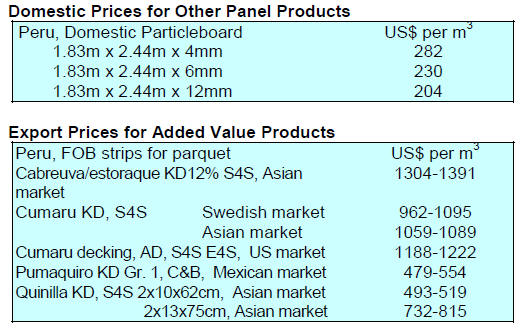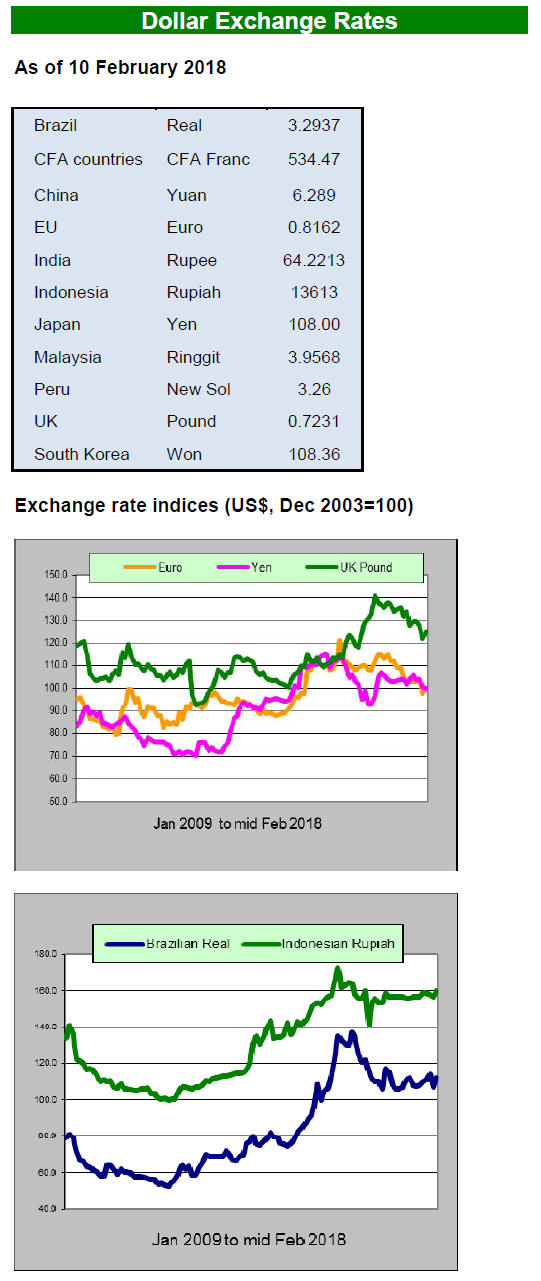2. GHANA
Furniture testing centre to improve competitiveness
To improve the quality and add more value to locally
made furniture a testing facility has been established by
the Timber Inspection Development Division (TIDD)
near Kumasi, a centre for wood product manufacturers.
The centre has modern equipment for testing furniture,
plywood and wood-based panels and was made possible
by technical support from UNIDO.
Funding of the project was provided by the Government of
Switzerland under tits Trade Capacity Building
Programme. This centre, say analysts, is the first of its
kind in the West Africa.
The centre is expected to stimulate growth in
Ghana’s
added value wood product sectors. The Minster for Trade
and Industry, Alan Kwadwo Kyeremanteng, has said the
government will do all it can to support growth in the
wood products sector to lift Ghana’s productivity and
competitiveness locally and internationally.
Praise for efforts to reclaim degraded forests
The Forestry Commission has engaged local firms to help
with the reclamation of forest reserves degraded by illegal
mining. Over the next 12 months the work will be carried
out in the worst affected areas in the Ashanti, Eastern and
Western regions.
The Chief Executive of the Forestry Commission,
Kwadwo Owusu Afriyie, announced these plans during a
tour of affected areas by Commission officials and the
Chairman of the Parliamentary Select Committee on
Lands and Natural Resources.
The Commission has indicated it will recruit an additional
15,000 personnel, half of which will be trained as forest
guards to strengthen measures against illegal activities in
forest reserves.
In the State of the Nation address, the President, Nana
Addo Dankwa Akufo-Addo, praised the efforts of the Inter
Ministerial Team on galamsey (illegal mining).
Ghana to host international trade fair
In conjunction with the Ghana International Trade Fair
scheduled from 28 February to 2 March in Accra, BVRio
will hold an event dedicated to promoting the trade of
100% legal and certified timber dubbed ‘The Responsible
Timber Trade Fair’.
The BVRio website says the event will provide an
opportunity to meet with potential trading partners in the
region. Leading experts will provide an overview of trends
in West African timber trade, the regulatory framework
involved and progress in eliminating illegal timber from
the international timber trade.
BVRio is an electronic marketplace where timber
producers and traders have the possibility to promote
timber products.
For more see: http://tradefairgh.com/
and
https://bvriotradefairs.org/

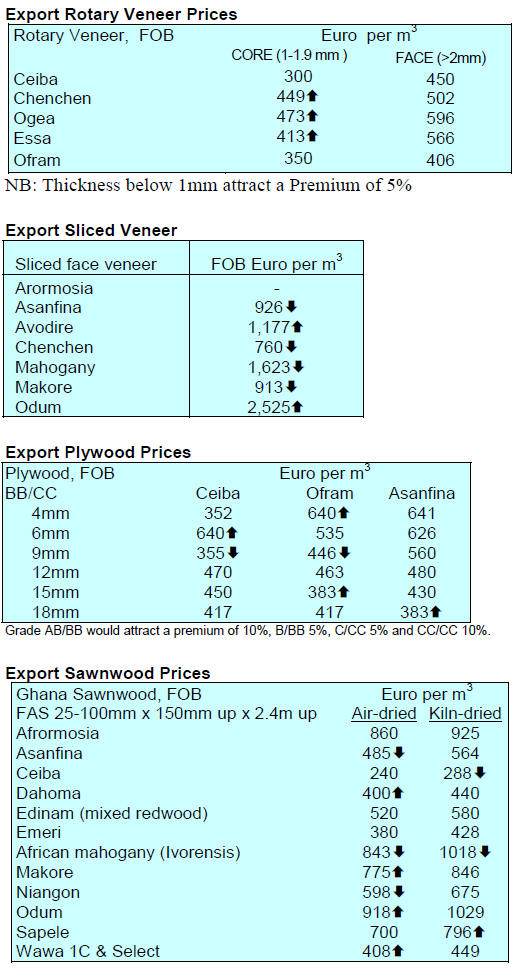
3.
MALAYSIA
Malaysia’s exports and the
strengthening ringgit
Malaysia’s exports rose almost 19% in 2017 compared to
a year earlier, the fastest pace of expansion since 2005.
For the ninth consecutive year, China was again
Malaysia’s main trading partner. Last year Malaysia’s
exports to China rose by almost a third while imports
jumped 15%.
Of concern to exporters is the pace at which the ringgit is
appreciating, especially against the US dollar. Furniture
exporters have voiced concern saying their
competitiveness will inevitably be undermined by the
stronger ringgit.
Analysts write that few of Malaysia’s furniture exporters
use hedging to minimise currency fluctuation risks. In
addition to the impact of a strong local currency,
manufacturers are facing rising production cost as wages
rise.
Gaharu wood worth millions seized
Forestry officials in Sabah have seized a huge quantity of
illegally harvested gaharu wood (known in international
markets as agarwood or aloeswood) a fragrant dark wood
used in incense, perfume and carvings.
Sam Mannan, the Director of Forestry in Sabah,
announced that the timber was stolen from protected forest
areas including the Maliau Basin. During a survey in 2004
it was estimated that there were around 3 million karas
trees (the source of gaharu wood) in the state but illegal
cutting has halved that number.
Commercial arm of the Forest Research Institute
launched
Malaysia’s Deputy Prime Minister recently officially
launched FRIM Inc., the commercial arm of the Forest
Research Institute (FRIM), a statutory agency of
the Government of Malaysia. FRIM Inc. was established
last year as a FRIM’s subsidiary to transform and
commercialise research and development findings as well
as deliver FRIM’s technical services.
FRIM Inc. will conduct marketing and sales activities for
FRIM R&D products, expertise and skills services,
intellectual property (IP) protection services, technical
services in the form of technology transfer and training as
well as commercialisation of IP in open markets. From
December 2017 to January 2018, the company has secured
business worth around RM1 million.
https://www.frim.gov.my/en/tpm-lancar-frim-inc/?wppaoccur=
1&wppa-cover=0&wppa-album=462&wppa-photo=2278
4.
INDONESIA
Success in slowing
deforestation
Indonesia has reported a significant decline in
deforestation over the past years. In a recent statement to
the press, the Minister of Environment and Forestry, Siti
Nurbaya, said total deforested area between 2016 and
2017 was recorded at just over 496,000 hectares a 20%
decline compared to the 630,000 hectares in the period
2015-2016.
Siti said strengthened forest management, hard work by
the country’s forestry staff and the moratorium on clearing
for palm oil plantations had brought down the pace of
deforestation.
http://nasional.republika.co.id/berita/nasional/jabodetabeknasional/
18/01/29/p3b5la284-klhk-angka-deforestasimenurun
In related news, the Minister said plans are being made to
take back unused land which had been allocated but not
cleared for palm oil plantations. She hinted that if the land
in question has a recoverable forest then it will be secured
as natural forest.
Plantation production can underpin export growth
The Secretary General in the Ministry of Environment and
Forestry, Bambang Hendroyono, said Indonesia will
export wood products worth around US$12 billion this
year. In support of this the Chairman of the Indonesian
Forest Entrepreneurs Association (APHI), Indroyono
Soesilo, said Indonesia export potential is yet to be fully
realised. But, as plantation log production expands
investment in export oriented production will follow.
In 2015 planation log production was 32 million cubic
metres which expanded to 33 million in 2016 and then 39
million in 2017.
However, to achieve export growth the government must
act to encourage investment said Indroyono Soesilo,
Chairman of APHI.
Indroyono suggested that business activities need to be
diversified into area such agroforestry, ecotourism,
environmental services and bioenergy.
APHI offered suggestion to the government on ways to
expand exports from the forestry sector including speeding
up work to demarcate concession boundaries, expanding
market promotion and addressing deregulation.
Industry calls for allowing semi-finished rattan exports
Julius Hoesanoesan, Vice Chairman of Indonesian Rattan
Entrepreneurs (APRI), has indicated that association
members want the Ministry of Commerce to allow exports
of semi-finished rattan this year. This, they say, will allow
the industry to recover and become a profitable sector
once more.
Their argument is that domestic demand has dropped and
many enterprises that produced semi-finished rattan have
stopped operation. In response, the Director General of
Foreign Trade in the Ministry of Trade, Oke Nurwan, has
said the Ministry is still gathering data on the demand in
the domestic rattan industry so that it can determine a
suitable policy on rattan exports.
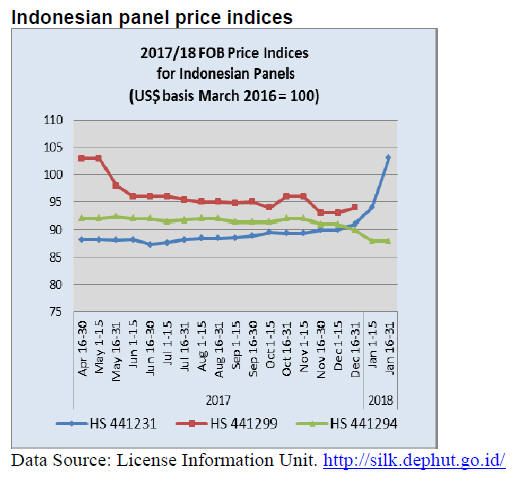
5.
MYANMAR
Royalty rates to be raised
The domestic media (Daily Eleven) has quoted a Forest
Department spokesperson as saying the Department is
revising the royalty on Myanmar’s natural forest timber
species. Reports say teak, padauk and tamalan will now
attract a 30,000 Kyats per ton, Pyinkado and Inn-Kanyin
20,000 per ton and between 6-10,000 Kyats per ton for
others species depending on their commercially value.
However, if the timbers come from the forest conversion
areas or are confiscated timbers a different rate will apply
namely 150,000 Kyat per ton for teak logs, 300,000 Kyats
per cu.m for teak sawnwood and 150, 000 Kyats per ton
for padauk and tamalan logs. Anlaysts write “it is
understood that the revenue is to be paid by the Myanma
Timber Enterprise to the Forest Department”.
No harvesting in Kayah State
In the another development, harvesting in Kayah State for
2018-19 will be postponed despite the fact that the Forest
Department estimated the annual allowable cut for the
State to be 10,000 tons for hardwoods.
The Regional Government and the Civil Society have
welcomed this. It is noted that it will be third consecutive
year of logging suspension in Kayah State.
Hot-line opens for public to report illegal logging
The Forest Department has introduced a ‘Community
Monitoring and Reporting System’ through which anyone
can contribute to combat illegal logging. The Forest
Department has announced ‘Hot Line’ telephone numbers
for people to call in and report illegal logging.
Further action against illegal forest activities has been
discussed in parliament and news laws and regulation to
protect the natural resources, to reduce the dependency on
the raw materials and to encourage value-added
production are being considered.
Private sector wants interest rate cut
A debate between members of parliament, the business
community and the banks on the need to reduce interest
rates has become very heated. Currently, Myanmar banks
offer 8% on saving but charge 13% on loans. One member
of parliament proposed a 1% drop in interest on savings
and a 2% cut in loan rates. The private sector has been
pointing out that the current interest rates and the
unfavorable tax regime do not encourage investment and
trade.
On a brighter note it has been hinted that the revenue
department will eliminate the 2% withholding tax which is
also called the retention tax.
Currently, all exporters have to pay 2% on the value of the
exports prior to shipment. In response to the complaints
from the private sector the Ministry of Planning and
Finance made it clear through the local media that
Myanmar has the lowest tax rate amongst ASEAN
members.
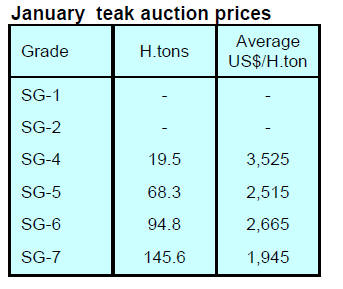
6. INDIA
Wood product price index slides
India’s official wholesale price index for all commodities
(Base: 2011-12=100) for December 2017 released by the
Office of the Economic Adviser to the government (OEA)
declined to 115.7 from 116.3 from the previous month.
The annual rate of inflation, based on monthly WPI, in the
financial year so far was 2.21%.
The overall price index for wood and cork products
declined 130.3 from 131.6 in the previous month due to
due to lower price of sawnwood and wooden boxes/crates.
However, the price of plywood and blockboard moved up.
The press release from the Ministry of Commerce and Industry
can be found at: http://eaindustry.nic.in/cmonthly.pdf
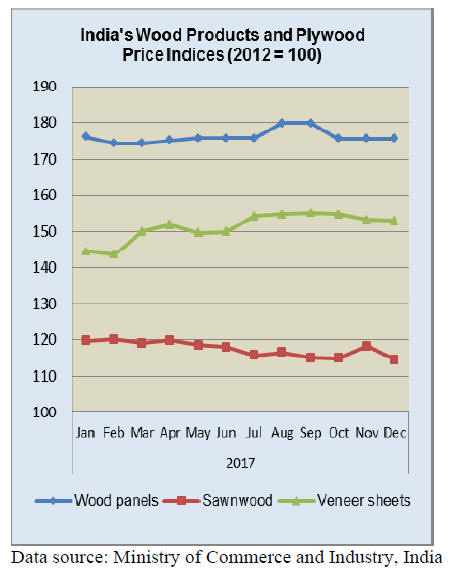
PEFC lauds Indian certification system
In a press release after the official launch, Sarah Price,
Head of Projects and Development at PEFC International,
said that given the size of India and the diversity of its
forests, the development of a national certification system
is to be applauded.
Shri Siddhanta Das, Director General of Forests and
Special Secretary, Government of India, added that India
has practiced scientific management of forests since 1864,
built upon the principles of sustainability.
Early forest management was predominantly focused on
timber extraction but now there has been a shift to achieve
sustainable ecosystems as well as the sustained livelihoods
forest communities.
PEFC worked with the Indian Network for Certification
and Conservation of Forests (NCCF) headed by Mr. Vijai
Sharma. NCCF was responsible for developing the Indian
national system, a task that began in 2015.
“To achieve our commitments for mitigation and
adaptation to climate change, we have to take forestry
beyond forests, through agroforestry, urban plantations,
plantations by corporations, companies, communities and
voluntary organizations,” said Mr. Sharma.
See: https://www.pefc.org/news-a-media/general-sfmnews/
2490-india-launches-its-national-forest-certification-system
Expansion of bamboo resources supported in
government budget
In the 2018 budget the government has allocated Rs 12.9
billion to promote the bamboo sector. The aim, say
analysts, is to expand India’s ‘green cover’ and at the same
time create a resource base for the panel, furniture and
joinery sectors.
Currently most of India’s bamboo resources are in the
North East Region and is vital to local industries
especially the rural poor.
Opportunities await at Delhiwood 2019
In readiness for DelhiWood 2019 the organisers have
produced a useful overview of the Indian wood processing
sector and market prospects for wood products.
The Delhiwood press release says the Indian woodworking
and furniture manufacturing industry is worth around
US$20 billion annually (and growing) and employs over 3
million in the so-called organised sector which contributes
less than half to total output from the sectors.
Further Delhiwood says the Indian furniture industry is
expanding in line with increasing income levels and that
this is also influencing consumer purchasing trends. The
company makes the point that these trends provide an
opportunity for suppliers to the furniture manufacturing
sector.
The press release says “while wooden home furniture is
the biggest segment, the fastest growth is seen in the
modular furniture and the kitchen segment. The industry
has seen a compounded annual growth of 30%.”
For more see:
http://www.delhi-wood.com/market_scenario.html
Imported plantation teak
Reduced freight rates, along with the weaker US dollar, on
top of a plentiful supply have worked to keep import costs
in check.
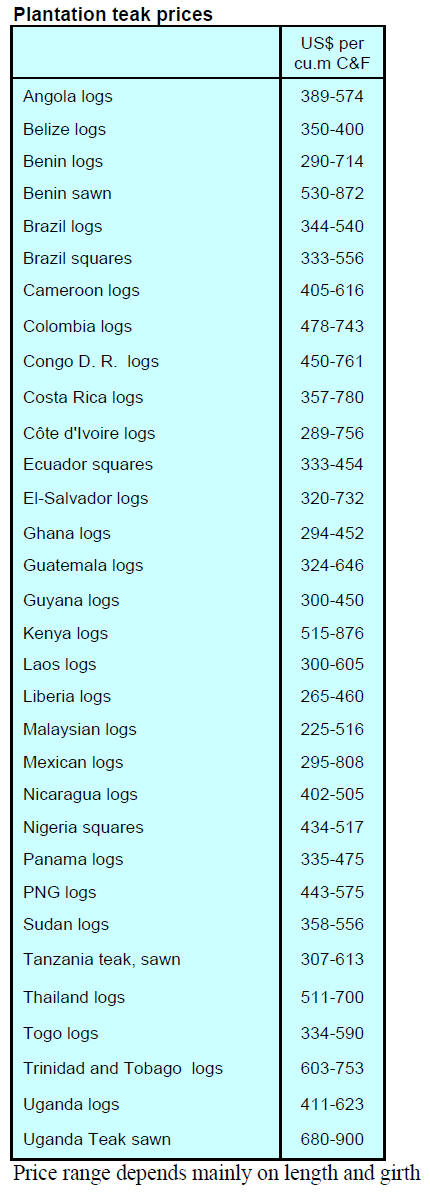

Locally sawn hardwood prices
Prices for imported hardwoods and pine remain
unchanged. Analysts report that demand is picking up as
housing projects get underway, especially in the low and
medium cost sectors. However, with the current stiff
competition in the retail market importers have little
opportunity to raise prices.
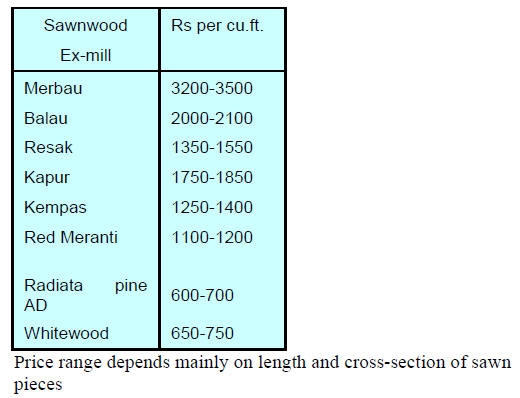
Imported sawn Myanmar teak
Imports of Myanmar teak are flat and traders report sales
are also flat as the competition with alternative timbers
heats up.
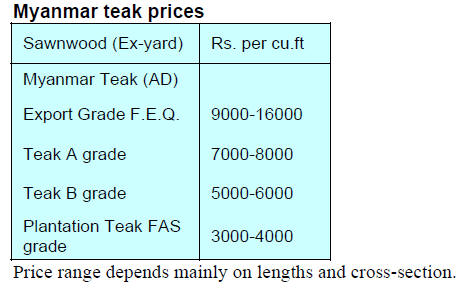
Prices for imported sawnwood
Prices for imported sawnwood (KD 12%) remain
unchanged.
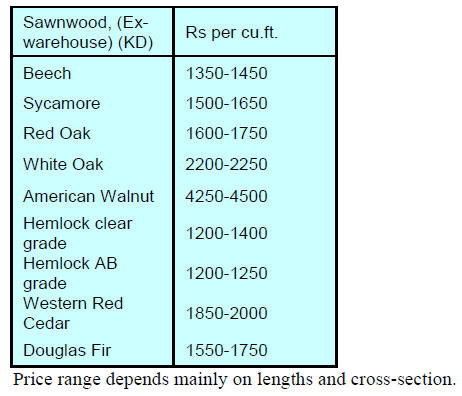
Domestic plywood prices
Plywood production capacity in India has expanded and
this is putting pressure on log prices but manufacturers are
still maintaining the same prices as in January.
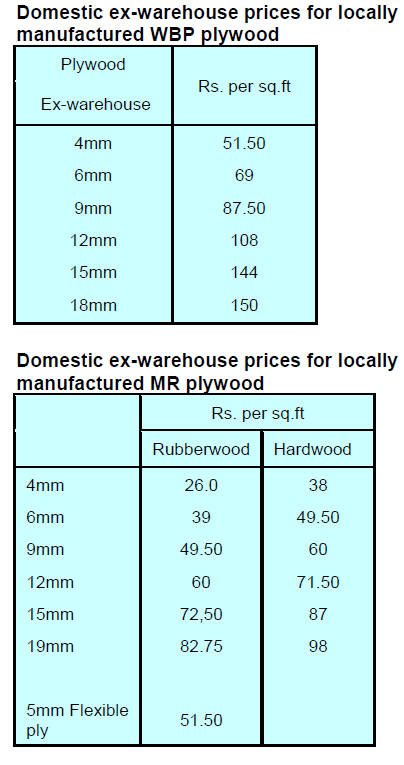
7. BRAZIL
Stellar export performance by
plantation sector
Brazil’s 2017 pulp exports increased 14% to US$6.4
billion. Paper exports were up marginally to US$1.9
billion and woodbased panel exports jumped 16% to
US$289 million. Overall, 2017 was positive for the woodbased
industry which saw a 13% increase in the trade
balance.
In terms of volume, international trade in 2017 was good
with the pulp industries seeing a 2.3% rise in export
volumes to 13.2 million tonnes. The woodbased panel
sector did exceptionally well seing a 21% increase in
export volumes to 1.3 million cubic metres.
China remained the main buyer of Brazilian pulp in 2017
increasing its consumption by 19% over the previous year
to US$2.6 billion. The other major market was Europe
where demand was up 7.5% to US$2 billion.
Latin America was the main market for wood panels and
paper and the region accounted for just over 52% of total
panel exports or US$151 million, an increase of 11%
compared to 2016.
However, growth in demand from the Asia/Oceania region
topped that at 74% for wood-based panels. In contrast, the
domestic market for wood panels registered a 4.0%
increase rising to 6.5 million cubic metres.
Furniture production increases in December
Furniture production in Brazil during December 2017
increased almost 3% month on month, the highest rise
since June 2013. Year on year, December 2017 production
increased 4.3%, the eighth consecutive rise. As result, of
the steady increase furniture sector output expanded
almost 5% in the fourth quarter of 2017.
Companies expecting tough trading conditions in
2018
Despite the growth in export volumes in 2017 revenue
continues to be below expectations, prompting the timber
industry not to be too optimistic for the coming year, at
time when there are likely to be political and economic
changes in the country.
According to the Brazilian Association of Mechanically-
Processed Timber Industry (ABIMCI) many companies
are expecting tough trading conditions in 2018 because of
the strengthening currency and because of the risk of
turmoil as a result of the presidential election dispute.
Several wood product sectors did well in 2017 but export
volumes were modest and profit margins were low, mainly
because of increased production costs and weakening
prices because production had got ahead of demand.
Brazil’s export of pine plywood in 2017 increased 19%
year on year and the monthly average shipment was
172,000 cubic metres, an expansion of around 27,000
cubic metres from a year earlier. Among the main markets
for pine plywood in 2017 were the United States (30%),
the United Kingdom (13%) and Germany (8%).
Exporters losing money because of bureaucratic
mix-up
Eleven timber exporting companies in Rond˘nia state have
to absorb a daily loss of about R$75,000 because there
shipments have been held up at the port of Manaus due to
a bureaucratic mix up. It has been reported that over 100
containers of wood products have been held for over 45
days even though there are no suggestions of irregularities
with the shipments which were inspected by IBAMA.
The problem arose because authorities in Manaus did not
recognise the inspection done in Porto Velho (capital of
Rondonia) which has federal customs officers who
inspected and sealed the containers. Unfortunately the
containers were opened at Manaus Port which broke the
chain of custody.
For the past three years shipments of wood products
through Porto Velho have been authorised as they are
covered by the Document of Forest Origin (DOF) an
obligatory license for transportation and storage of forest
products from natural forests. This license explicitly says
once inspected and sealed the container cannot be opened
until it reaches its final destination.
The Rond˘nia government has expressed concern that
shipments are being delayed because of misunderstandings
among the federal institutions.
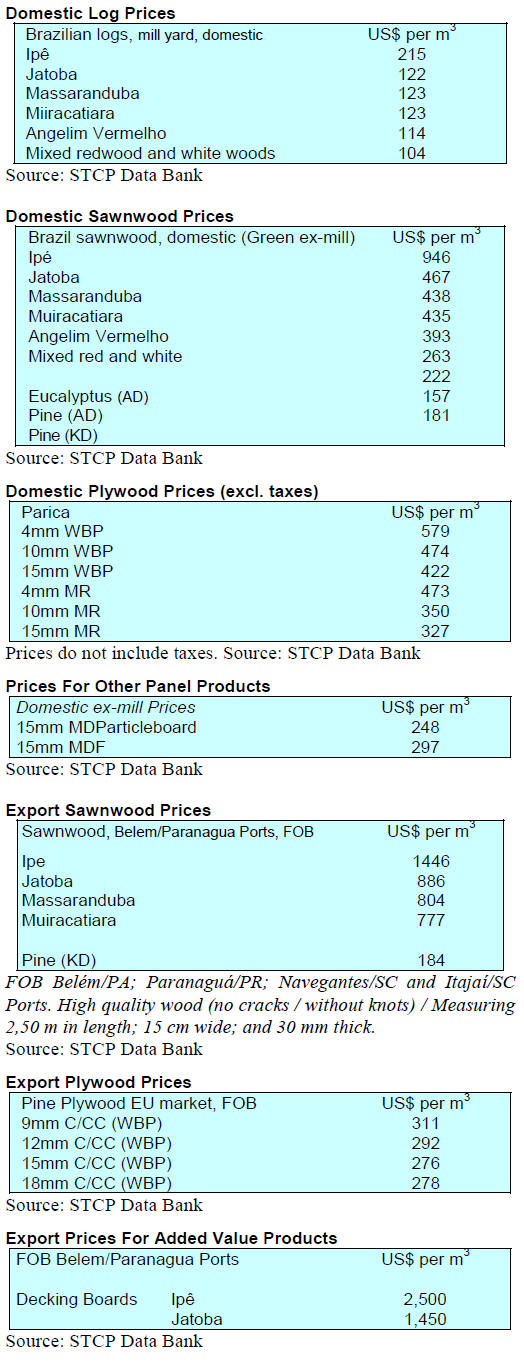
8. PERU
Composite panel imports
continue to expand
In 2017 Peruvian imports of particleboard (PB) and MDF
were worth almost US$84 million, an increase of 11%
compared to 2016. Ecuador was the main supplier in 2017
taking about a 40% share of total imports equal to US$33
million followed by Chile with a 33% share (US$28
million), Spain 14% and Brazil 13%.
The main importer in 2017 was once again Novopan Peru
with a US$31 million slice of total imports of PB and
MDF. The second ranked importer was Arauco Peru
(US$16 million). In third place came Grupo Martin which
accounted for around 14% of imports.
SERFOR penalises forestry consultants for
manipulating data
Under new powers it has been granted SERFOR has
initiated proceedings against more than 90 forestry
consultants for providing false information in management
plans prepared on behalf of clients.
Amongst this group are those who participated in the
preparation of management plans for an area from which
timber on board the MV Yacu Kallpa was seized in the
port of Tampico, Mexico after leaving Loreto carrying
what was suspected illegal wood products.
When the revised Forestry and Wildlife Law came into
force last October forestry, consultants ( now termed forest
regents) became responsible for the accuracy of data in
management plans and also, with their clients, for its
implementation. Those consultants sanctioned will no
longer be able to operate.
Statistical data base to aid policy and management
decisions
The General Directorates of SERFOR, the thirteen
Technical Forestry and Wildlife Administrations, the
Regional Governments and the National Superintendent of
Customs and Tax Administration (SUNAT) have joined
forces to compile an extensive statistical data base.
This, say analyst, contains statistical reports on forest
product exports and imports, data on vehicle inspections
from the control posts of the Forestry and Wildlife
Technical Administration, details of concessions and also
price bulletins. This says SERFOR will make it possible to
promote competitive businesses at a national and
international level.
This new consultative tool is interactive and easy to
access. Users can filter the information according to their
needs and share information easily.
